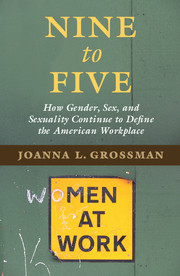Book contents
- Frontmatter
- Dedication
- Contents
- Foreword
- Acknowledgments
- Introduction
- PART I WHAT IS SEX DISCRIMINATION?
- PART II SEXUAL HARASSMENT
- 12 Workplace Affairs and Sexual Favoritism
- 13 Lolita at the Office
- 14 Sex Talk in the Writers’ Room
- 15 Sex Behind Bars
- 16 When the Supervisor Bullies Only Women
- 17 The Equal Opportunity Harasser
- 18 Periodontal Perils
- 19 Punishing Effeminacy
- 20 Late-Night Affairs with David Letterman
- 21 Why Herman Cain Has Not Been Able to Talk His Way Out of His Exploding Sexual Harassment Scandal
- 22 Why Hostile Environment Harassment Is a “Continuing Violation”
- 23 When Sexual Extortion Is Successful
- 24 The Consequences of Failing to Complain about Harassment
- 25 Who Is Responsible for Sudden, Severe Harassment?
- 26 Chinks in the Harassment Law Armor
- 27 Do Employer Efforts Prevent Harassment or Just Prevent Liability?
- 28 Who's the Boss?
- 29 Costly Mistakes
- 30 Hands Off the Merchandise
- PART III PREGNANT WOMEN AND MOTHERS AT WORK
- PART IV FEMALE BREADWINNERS AND THE GLASS CEILING
- Conclusion
- Notes
- Index
22 - Why Hostile Environment Harassment Is a “Continuing Violation”
from PART II - SEXUAL HARASSMENT
Published online by Cambridge University Press: 05 May 2016
- Frontmatter
- Dedication
- Contents
- Foreword
- Acknowledgments
- Introduction
- PART I WHAT IS SEX DISCRIMINATION?
- PART II SEXUAL HARASSMENT
- 12 Workplace Affairs and Sexual Favoritism
- 13 Lolita at the Office
- 14 Sex Talk in the Writers’ Room
- 15 Sex Behind Bars
- 16 When the Supervisor Bullies Only Women
- 17 The Equal Opportunity Harasser
- 18 Periodontal Perils
- 19 Punishing Effeminacy
- 20 Late-Night Affairs with David Letterman
- 21 Why Herman Cain Has Not Been Able to Talk His Way Out of His Exploding Sexual Harassment Scandal
- 22 Why Hostile Environment Harassment Is a “Continuing Violation”
- 23 When Sexual Extortion Is Successful
- 24 The Consequences of Failing to Complain about Harassment
- 25 Who Is Responsible for Sudden, Severe Harassment?
- 26 Chinks in the Harassment Law Armor
- 27 Do Employer Efforts Prevent Harassment or Just Prevent Liability?
- 28 Who's the Boss?
- 29 Costly Mistakes
- 30 Hands Off the Merchandise
- PART III PREGNANT WOMEN AND MOTHERS AT WORK
- PART IV FEMALE BREADWINNERS AND THE GLASS CEILING
- Conclusion
- Notes
- Index
Summary
The Supreme Court's decision in National Railroad Passenger Corp. (Amtrak) v. Morgan resolved an important, though admittedly technical, question relating to the interpretation of Title VII.
The case involved the statute's brief limitations period – which requires that suits be brought within either 180 or 300 days of when the alleged harassment occurred, depending on whether the state in which the suit is brought has a work-sharing agreement with the EEOC; the parties in the Morgan case agreed that the relevant period was 300 days.
The question the Court resolved was this: If a pattern of discrimination includes some incidents too early to fall within the relevant period, can those incidents still form part of the basis for a discrimination suit?
THE UNHAPPY EMPLOYMENT HISTORY OF ABNER MORGAN
This case arises out of the long-standing but troubled employment relationship between an African-American electrician named Abner Morgan and Amtrak. According to Morgan, from the time he was hired as an electrician helper in 1990 until the time he was fired in 1995, he was subject to a series of discriminatory acts at the hands of his employer. Morgan alleges that he was paid differently, punished unfairly, denied union representation in disciplinary meetings, and harassed because of his race. Amtrak, however, disputes many of these claims on the merits.
Amtrak moved for summary judgment on some of Morgan's claims based solely on the theory that they are time barred (that is, too early to come within the relevant statute of limitations). The trial court granted the motion, and dismissed all claims occurring prior to May 3, 1994, 300 days before Morgan filed a complaint with the EEOC. Then the remaining claims went to trial, but a jury found for Amtrak on all counts. That was not the end of the case, however, for the Ninth Circuit Court of Appeals held that the pre–May 3, 1994, claims should not have been dismissed in their entirety, for they could be actionable as long as they were “sufficiently related to those occurring within the limitations period.”
HOW FILING CHARGES UNDER TITLE VII WORKS
Title VII requires that complainants first seek relief from the EEOC, a federal agency charged with the responsibility of administering the nation's employment laws. Thus, before any potential plaintiff can file a lawsuit, he must first file a charge with the EEOC.
- Type
- Chapter
- Information
- Nine to FiveHow Gender, Sex, and Sexuality Continue to Define the American Workplace, pp. 130 - 135Publisher: Cambridge University PressPrint publication year: 2016



